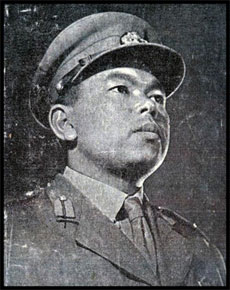One of Burma’s last surviving independence leaders has died in exile in China at age 93.
 Former Brigadier General Kyaw Zaw died on Wednesday at a hospital in southern China, where he had lived since fleeing Burma in 1976.
Former Brigadier General Kyaw Zaw died on Wednesday at a hospital in southern China, where he had lived since fleeing Burma in 1976.
Known as one of the “30 Comrades” who led the fight for Burma's independence from Britain in the 1940s, he was a founding member of the Burmese communist party.
He fled to China 35 years ago because of differences with the military junta ruling Burma at the time.
Former Burmese Army Chief Tin Oo, now a leader of the National League for Democracy, who fought alongside Kyaw Zaw for Burmese independence, praised him for pushing for the fair treatment of the country's ethnic minorities.
Kyaw Zaw's death is a great loss for Burma, Tin Oo told Voice of American.
Kyaw Zaw recently was granted permission to visit Burma in order to pay his respects at the Shwedagon Pagoda in Rangoon, one of Burma's most revered Buddhist sites, but he was too weak to make the trip.
A top government official told VOA's Burmese Service that the offer to return still stands for Kyaw Zaw's daughters, who lived with him in China.
After Burma gained independence in 1948, Zaw became famous as the commander who fought and defeated the Kuomintang who had fled China after the Communist victory in 1949 and had established bases in Burmese territory in the early 1950s.
The Kuomintang were supported by the United States and remained in Burma for a few years in the early 1950s making occasional forays into China to fight the Chinese communists.
During the period of 1953 to 1955, under Brigadier General Zaw's command the Burmese Army fought the Kuomintang and drove them out of Burmese territory into Thailand.
Between 1954 and 1955, Brig-Gen. Zaw also successfully led a campaign against the insurgent Karen National Union and established central government control in the Karen State.
Zaw was wounded by shrapnel in his thigh in 1949 during the Battle of Insein when the Karen National Defence Organisation laid siege to the capital Rangoon. He was commissioned by Ne Win during the crisis as the commanding officer and Zaw rated this battle as the bitterest with the greatest loss of life in his military career.


